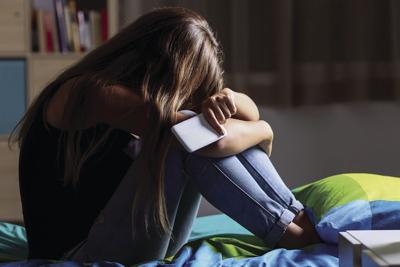BRATTLEBORO — For school-aged children and teens, their formative years changed all but overnight in March 2020 because of the COVID-19 pandemic.
Students told their friends “see you Monday,” then went home to a state of uncertainty that has lingered to the present day, nearly two years later.
“Young people have certainly faced significant disruption in their lives over the past two years,” said Laura Kelloway, manager of outpatient child, adolescent and family services at the Anna Marsh Clinic at the Brattleboro Retreat.
The jobs of social workers who work with youth and the roles of school counselors also changed in a flash as the professionals grappled with how to safely help those coming of age in a time of global crisis.
Gina Onorato, director of counseling at Brattleboro Union High School, said the school has a student engagement team that includes a social worker. The team focuses on assisting students with the transition to being back in the building and on keeping them engaged with their learning. She said the school has advised students and families how to seek mental health supports, inside and outside the school.
“The advice we often give to our families is to be able to talk to their student about how things are going and be aware of when their behavior might change and what to look out for if they notice any changes,” Onorato said. “We often appreciate when parents also reach out to us if they are concerned, so we can work together to support their student.”
What strikes Kelloway about the way young people have handled the crisis is their resilience.
“While the kids I know all express some level of frustration and fatigue related to the pandemic, they show such a willingness to cope with what is asked of them from school and their community,” she said. Through “pretty relentless disruptions,” she notices continued engagement in friendships, school, sports, theater, music and other activities.
During the peak of omicron, a recent, highly contagious variant of COVID-19, she saw mixed reactions among youths: Some expressed worry about school closures, with many saying another shutdown would be intolerable. Others said they would prefer quarantining for a few weeks rather than worry about getting or spreading the virus.
“The social isolation of the school closures was incredibly hard on young people,” Kelloway said. “I don’t think anyone wants to be in a position to revisit that.”
For adults looking for ways to support young people, she encourages patience, and remembering that there have been learning losses related to academics and social development. She emphasizes the importance of listening.
“Take a moment to validate their feelings, if you’re lucky enough to have a young person share their feelings with you,” she said. “Validation can feel a lot better than an adult trying to offer advice.”
She suggests, if parents or guardians notice their children to be particularly disengaged, sad or irritable, asking them what they think might be going on.
“If they won’t share, let them know you’re available anytime they are ready to talk and offer them outside support,” she said. For an assessment and therapist referral, she advises reaching out to the school guidance department or a pediatrician.












